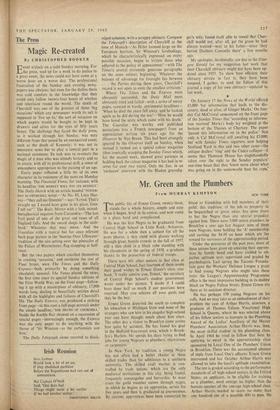The Press
Magic Re-created
By CHRISTOPHER BOOKER
EMIT o'clock on a cold Sunday morning. For the press, teed up for a week to do justice to a great event, the news could not have come at a worse hour on a worse day. The professional frustration of the Sunday and evening news- papers was obvious; but even for the dailies there was cold comfort in the knowledge that they could only follow twenty-four hours of wireless and television round the world. The death of Churchill was one of the greatest of those 'big occasions' which any newspaper worth its salt is supposed to 'live up to,' the sort of occasion on which papers would be bought to be kept in drawers and attics for the eyes of fifty years hence. The challenge that faced the daily press, as it worked through last Sunday, was very different from that posed by an unexpected event, such as the death of Kennedy: it was not to announce news but to play a central part in a national ceremony. Its task was to re-create the magic of a man who was already history; and so to create, with all its professional skill, a sense of atmosphere appropriate to the passing of an age.
Every paper reflected a little bit of its own character in its treatment of the news on Monday morning. The Financial Times, for instance, with its headline 'THE MARKET WILL PAY ITS RESPECT: The Daily Sketch with an article headed 'YESTER- DAY IN CHURCHILL ROAD'—'At No. 83, Lucy Har- vey—"they call me Queenie"—says "I cried. That's straight up. I would have gone in his place,-Guv. I tell yer".' The Daily Mirror with a lush, mixed- metaphorical requiem from Cassandra—`The last frail petal of one of the great red roses of all England falls. And the sword sleeps in the scab- bard.' Whatever that may mean. And the Guardian with a typical but for once relevant back-page picture in the 'Sunrise Over Ullswater' tradition of the sun setting over the pinnacles of the Palace of Westminster, flag dropping at half- mast.
But the two papers which excelled themselves in creating 'occasion,' and outshone the rest of Fleet Street, were The Times and the Daily Express—both primarily by doing something absolutely unusual. The Times placed the news, the first time since its special Sunday editions of the First World War, on the front page—follow- ing it up with a masterpiece of obituary, 17,000 words long, dealing in beautifully written detail with all the highlights and failures of Churchill's life. The Daily Express, too, produced a striking front page--in this case a full-page portrait under the simple headline, `THE DEATH OF CHURCHILL.' Inside the Keeble flair showed on a succession of special pages:—interestingly enough, the Express was the only paper to do anything with the theme of 'Sir Winston—as the cartoonists saw him.'
The Daily Telegraph alone resorted to black- edged columns, with a scrappy obituary. Compare the Telegraph's description of Churchill at the time of Munich—`As Hitler loomed large on the European horizon, Sir Winston's forebodings, which he characteristically expressed on every possible occasion, began to irritate those who adhered to the policy of appeasement'—with The Times's several extremely generous paragraphs on the same subject, beginning. 'Whatever the balance of advantage for foresight lies between . . . the Parties during these years, Churchill's record is not open to even the smallest criticism.'
Where The Times and the Express most obviously succeeded, the Daily Mail most obviously tried and failed—with a series of messy pages, covered in wordy, sentimental headlines— `When he died the years fell away, and he looked again as he did during the war'—'How he would have loved the unity which came with his death.' The Guardian was worthy and published quotations (via a French newspaper) from an appreciation written six years ago for the Observer by Nye Bevan. This had been strangely ignored by the Observer itself on Sunday, when instead it rushed out a special colour magazine (thus ironically scooping the Sunday Times which, for the second week, showed great patience in holding back the colour magazine it has had in re- serve for over two years). Only the Sun, in an `exclusive' interview with the Bladon gravedig-
ger's wife, found itself able to reveal that Chur- chill would not, after all, get the grave he had always wanted—next to his father—since 'they buried Duchess Consuelo there' a few months ago.
My apologies, incidentally, are due to the Glas- gow Herald for my suggestion last week that their Churchill obituary might not have been up- dated since 1937. To show how efficient their obituary service in fact is, they have been tempted, I gather, to send the Editor of this journal a copy of his own obituary—updated to last week.
On January 17 the News of the World offered £5,000 'for information that leads to the dis- covery, dead or alive, of Ginger Marks.' On Sun- day Cal McCrystal announced on the front page of the Sunday Times that 'according to informa- tion received' Marks's body lay weighted at the bottom of the Thames at Chertsey. The paper 'passed this information on to the police.' Not only is Cal McCrystal still awaiting his £5,000; but with Sunday Times reporters now helping Scotland Yard in this and two other cases—the antique dealers' ring' and the Cadco collapse—it seems that Thomson House has singlehandedly taken over the right to the Sunday populars' one-time boast that they 'knew more about what was going on in the underworld than the cops.'


































 Previous page
Previous page